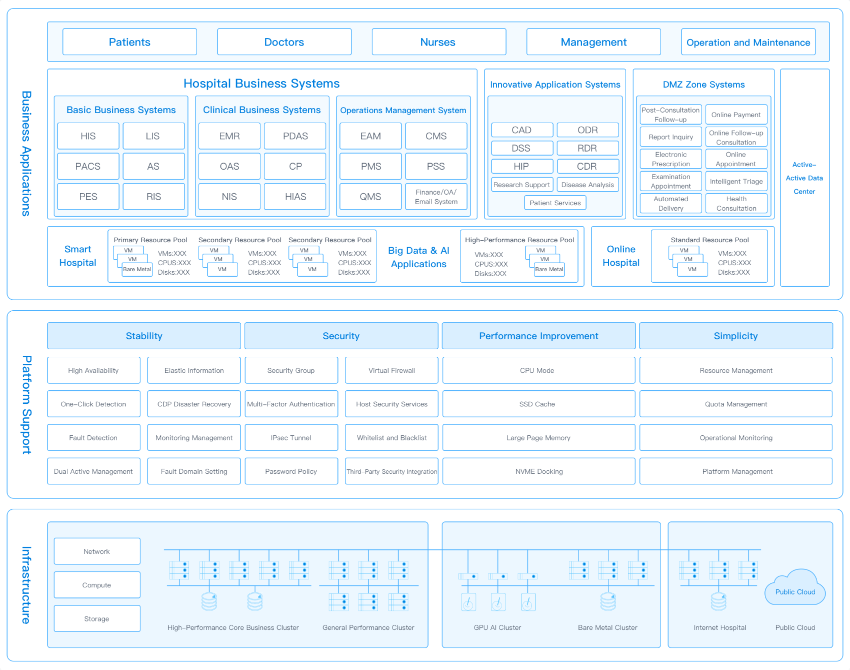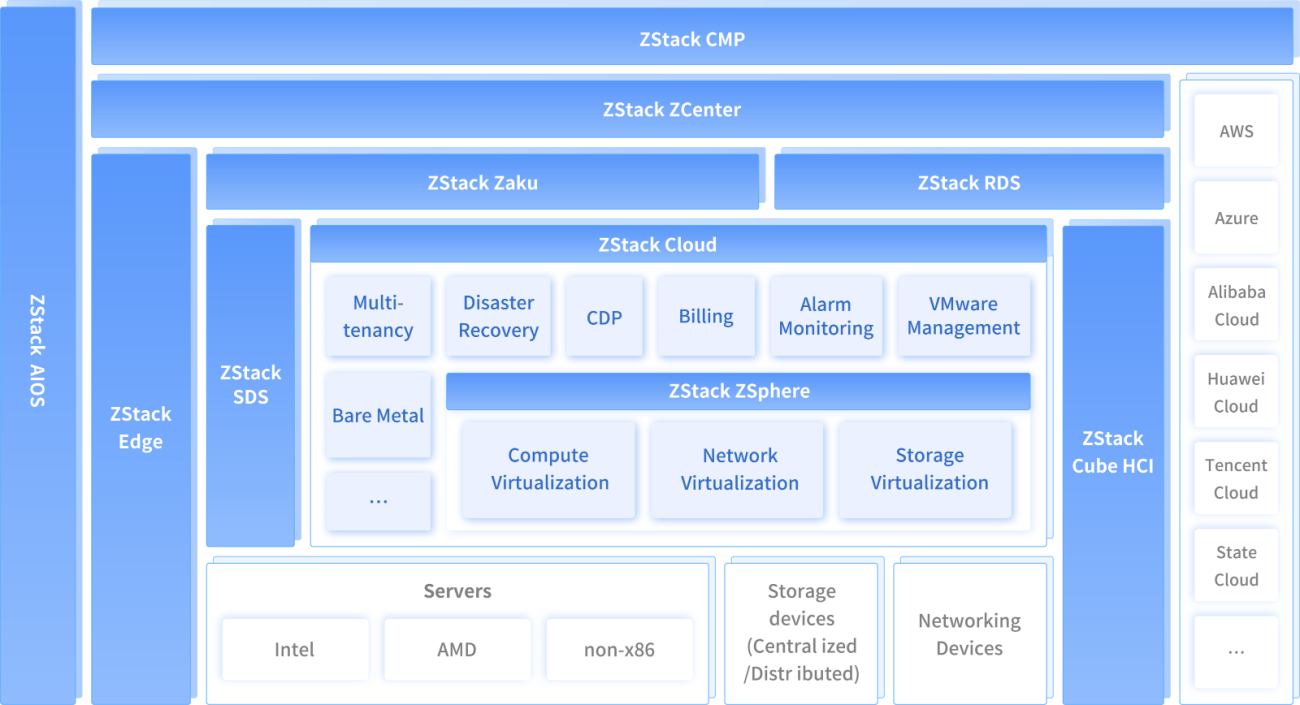ZStack Cloud Platform
Single Server, Free Trial for One Year

ZStack healthcare solutions offer customized options for the medical industry, covering a comprehensive range of data center cloud infrastructure through its product, which includes virtualization cloud,distributed storage, multi-cloud management platforms, and HCI.These solutions meet the diverse construction needs of various scenarios, such as business systems, internet services, healthcare big data, and data center disaster recovery. This helps the healthcare industry build stable, secure, highperformance, and userfriendly cloud infrastructure.
View image in full screen >The massive amount of data generated by the digital transformation of healthcare imposes higher demands on the stability and service continuity of cloud platforms. This not only requires 24/7 service throughout the year but also ensures that, in the event of data center failures, unforeseen disasters, and other uncontrollable risks, the business can quickly recover, thereby guaranteeing the smooth delivery of healthcare services and a seamless patient experience.

To address the core business needs of the Hospital Information System (HIS), three high-performance solutions are offered: all-flash distributed storage, elastic bare metal, and centralized storage integration. These solutions reduce access latency in the HIS system and enhance operational stability.

Three interface models of distributed storage match the massive unstructured data business needs of PACS, enhancing the speed of PACS image reading. The three capabilities of GPU pass-through, GPU virtualization, and GPU resource pooling support image processing.

The ability to fully reutilize existing hardware helps users leverage their current servers to support non-core hospital operations, thereby reducing overall procurement costs.

Tenant isolation mode helps users manage the lifecycle, avoid resource waste and untimely recovery, while ensuring that test operations do not interfere with each other.
The deployment of internet business in the DMZ (Demilitarized Zone) involves handling a large amount of sensitive information, which faces more diverse, frequent security threats and higher security requirements. To meet the flexibility of resource allocation and security needs, the management and maintenance of the DMZ area are held to higher standards.

Network virtualization capabilities such as Elastic IP and port forwarding align with the demands of the DMZ (Demilitarized Zone) network for external services, ensuring secure isolation.

Break through the barriers to mainstream third-party public cloud resource pools, integrate the hospital’s internal core medical business systems with the Internet hospital platform, and ensure secure data exchange.
With the widespread adoption of electronic medical records (EMRs), the reuse of medical record data has become more convenient. Well-structured medical record data can not only be used for clinical purposes, research, teaching, and operational management decisions, but it can also support large-scale automatic analysis of medical records. This type of automatic analysis can assist in decision-making more efficiently and accurately.

Provide three modes of GPU capabilities: GPU passthrough, GPU virtualization, and GPU resource pooling, to support medical big data analysis and AI applications, accelerate model training, and enhance logical reasoning.

An open API interface allows a medical data platform to quickly implement API integration, helping users build a comprehensive medical data application system that integrates big data applications with cloud infrastructure.

The unified authentication module implements Single Sign-On (SSO) for the healthcare big data platform, enabling seamless access to the Clinical Data Repository (CDR), Operational Data Repository (ODR), and Research Data Repository (RDR).
The massive amount of data generated by the digital transformation of healthcare imposes higher demands on the stability and service continuity of cloud platforms. This not only requires 24/7 service throughout the year but also ensures that, in the event of data center failures, unforeseen disasters, and other uncontrollable risks, the business can quickly recover, thereby guaranteeing the smooth delivery of healthcare services and a seamless patient experience.

The distributed storage expansion cluster technology implements a dual active data center, helping hospitals establish remote disaster recovery for their business systems and achieve a dual active functionality for core systems across different locations.

A dual-active data center solution enables second-level synchronous backup, while the disaster recovery/CDP module ensures no data loss for application systems, providing stable support for the core healthcare system.

Standardized imaging, release of service catalog, unified management and operations.

The white paper covers four major healthcare application and typical customer cases.
DownloadZStack has comprehensive products, including cloud, virtualization, distributed storage, multi-cloud management platforms, and HCI, fully covering the data center cloud infrastructure. It enhances the innovation capabilities, quality standards, intellectual property protection, and production management efficiency in the healthcare industry, thereby strengthening the core competitiveness and international influence of healthcare enterprises.


ZStack Cloud platform provided a replacement upgrade for VMware virtualization, assisting Rangtang County People's Hospital in transitioning from virtualization to cloud infrastructure. This was achieved through ZStack Cloud’s capabilities in hardware repurposing, VMware management modules, and V2V migration.

ZStack Cloud platform provided a replacement upgrade for VMware virtualization, assisting Rangtang County People's Hospital in transitioning from virtualization to cloud infrastructure. This was achieved through ZStack Cloud’s capabilities in hardware repurposing, VMware management modules, and V2V migration.

ZStack Cube’s hyper-converged solution enables the replacement and upgrade of existing physical machines and virtualization platforms, facilitating the efficient operation and unified management of core business systems such as HIS (Hospital Information System), LIS (Laboratory Information System), EMR (Electronic Medical Record), and PACS (Picture Archiving and Communication System). At the same time, with the help of the CDP (Continuous Data Protection) module, a dual-center disaster recovery platform is built to provide real-time backup of the original data center’s operations, effectively ensuring data security.

The ZStack cloud platform offers flexible horizontal and vertical scalability, allowing for elastic expansion as business grows. Changde Medical Cloud started on a small scale, and in its first phase, it provided cloud resources for Changde Maternity and Child Health Hospital, rapidly expanding from just a few hundred cores to several thousand cores. This supported the gradual migration of all the hospital’s business systems to the cloud. Seizing this opportunity, the “Medical Cloud Zone” was established to serve multiple healthcare institutions.